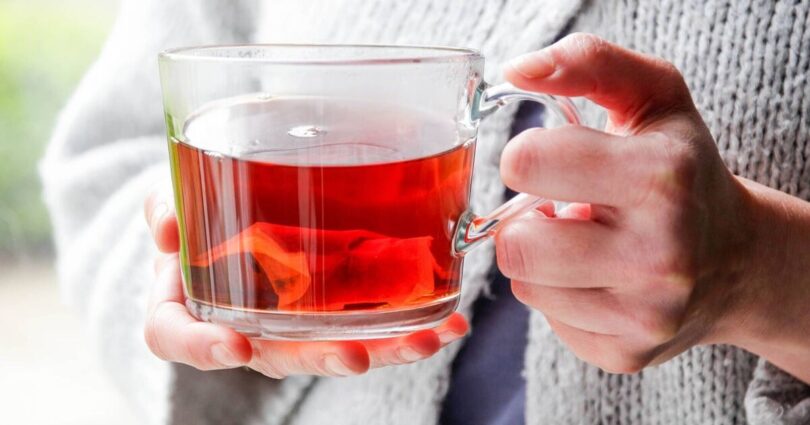A recent study published in the Annals of Internal Medicine has revealed that consuming two or more cups of tea daily could lower the risk of death compared to non-tea drinkers. Tea, rich in beneficial compounds such as antioxidants, can boost overall health.
Previous research conducted in China and Japan suggested that regular green tea consumption is associated with improved health and reduced mortality risk. However, studies on populations primarily drinking black tea have not yielded conclusive results.
Black tea, derived from the fully oxidised leaves of the Camellia sinensis plant, is known for its robust flavour and dark brown colour. The researchers aimed to investigate the link between tea consumption and mortality risk in a population predominantly consuming black tea.
They used data from the UK Biobank, a biomedical database of British individuals. The study was based on nearly 500,000 men and women aged between 40 and 69 who reported their daily tea consumption, specifying whether it was black or green tea and if they added milk or sugar.
Genetic testing was carried out to determine their caffeine metabolism ability. Among the regular tea drinkers in the study, around 90 per cent preferred black tea, reports Bristol Live.
The study participants were observed for an average of 11 years. Compared to those who didn’t drink tea, individuals who consumed two or more cups daily had a nine to 13 per cent lower risk of death from any cause.
The research found that tea drinking was linked with a decreased risk of death from stroke, coronary heart disease, and overall cardiovascular disease when specific causes of death were examined. The study suggested that increasing tea consumption did not further reduce the risk of death.
Whether individuals drank two cups or 10 or more cups daily, the risk remained relatively consistent. The researchers also found that the link between tea drinking and a reduced mortality risk persisted, even when participants added milk or sugar to their tea or had a genetic predisposition for slower caffeine metabolism.
This study suggests a correlation between tea consumption and a reduced risk of death, particularly from stroke or heart disease. These findings align with previous studies that have associated green tea with enhanced health benefits.
While this research indicates a relationship between tea drinking and a decreased risk of death, even when sugar is included, it’s still advisable to moderate your overall sugar intake. The British Heart Foundation advises: « Having too much sugar can lead to putting on excess weight, which is linked with an increased risk of coronary heart disease, strokes and developing type 2 diabetes. »
Is black tea healthy?
Black tea is hailed as a boon for heart health and can be a valuable addition to a balanced diet. It boasts several potential health benefits, such as bolstering heart health, reducing cancer risk, and minimising the threat of diabetes, although more research is required to substantiate these claims.
Black tea is abundant in antioxidants and compounds that may help mitigate the risk of chronic diseases like heart disease and stroke. Theaflavins contribute to lowering blood cholesterol levels, while flavonoids – antioxidants also found in red wine, dark chocolate, and nuts – can reduce heart disease risk by 8 per cent.
This tea variety is brimming with flavonoids, theaflavins, and other antioxidants that could aid in reducing blood pressure and cholesterol levels – decreasing the probability of heart-related complications and strokes. Black tea contains caffeine and L-theanine, which may boost alertness and focus, too.
Black tea is rich in polyphenols, which can promote the growth of beneficial bacteria and lower the chances of developing certain diseases and cancers. Additionally, it may aid in digestion and help reduce inflammation.
Some studies even suggest that black tea could possess potential cancer-preventing properties. Despite the encouraging findings, it’s crucial not to assume that tea consumption will automatically improve your health, as this research does not provide enough evidence to recommend changing your drinking habits.
The most effective ways to enhance your chances of leading a long and healthy life include:
- Quitting smoking
- Eating a balanced diet and cutting out processed foods
- Getting enough quality sleep
- Exercising regularly
- Drinking plenty of water and limiting alcohol
- Maintaining a healthy weight
However, it is key to note that although caffeine can be beneficial, excessive consumption may lead to anxiety, dehydration, and dizziness. Also, black tea has oxalates that could play a role in developing kidney stones. Meanwhile, consuming very hot tea regularly might harm the oesophagus lining.
Black tea doesn’t provide many nutrients. In contrast, green tea has more L-theanine than black tea and is also high in the antioxidant EGCG.
Source link








